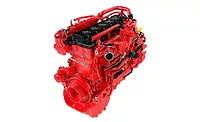Natural Gas technology benefits from dedicated manufacturers
Hybrid technology challenged by economics, current market

With petroleum fuel prices at their lowest in recent history, the cost of being “green” has been driven higher than ever. Like any technology, green technology must pass the return-on-investment (ROI) test to justify its purchase. Altruistic or community relations have motivated some fleets to invest in the technology, but many fleets insist on a measurable ROI before investing.
Unfortunately, one of the key factors driving green tech ROI is fuel cost. When fuel costs are high, the return on many green technologies can be fairly rapid. However, the current low-fuel prices have virtually eliminated the return for many green technologies.
For example, when diesel fuel prices had risen to more than $4 a gallon, the payback period for then-current diesel-electric hybrid dropped below seven years, which is the average replacement cycle for medium-duty trucks in the beverage industry. However, for the hybrid technology to pay off, those fuel prices need to remain consistent for the seven-year lifecycle of the hybrid-equipped truck.
The combination of hybrid tax incentives being discontinued and dropping fuel prices has led to a virtual halt in the diesel-electric hybrid market. The likely scenarios for breathing life back into the hybrid market will need to include restarting tax incentives for reducing exhaust emissions, and/or a dramatic drop in the price of the batteries that enable hybrid technology.
Natural Gas Vehicle (NGV) technology is a green technology that has benefited from the expanded exploration and production of petroleum fuels behind the current low prices for gasoline and diesel. Although some natural gas production results from dedicated exploration, a significant amount of natural gas production is a byproduct of petroleum exploration and production.
Although natural gas prices have remained level or dropped, the increased production of natural gas has led to increased availability and deployment of fueling infrastructure. Added to this are ongoing federal, state and local incentives for natural gas fueling, fueling infrastructure and NGVs. As hybrid technology has become less economically viable, the economics of NGVs have improved on many fronts.
Even though there’s a viable business case for natural gas-powered trucks, they’re not without a few challenges. Fortunately, full-service leasing providers like Miami-based Ryder can offer beverage fleets an easy path to deploying NGVs, as well as turn-key servicing with properly trained technicians and equipped service facilities.
Currently, Ryder has nearly 1,000 NGVs operating within its portfolio across numerous customer segments. That fleet is a mixture of NG trucks and tractors, but primarily is comprised of day-cab tractors.
“We play a significant role in the food- and beverage-delivery segment and have thousands of diesel and natural gas vehicles dedicated to customers who are supporting that industry,” says Scott Perry, Ryder’s vice president of supply management and global fuel products. “Within the beverage segment, we have seen a number of our lease customers utilize our program to enter the natural gas fleet world.”
Service technicians with unique skill sets are necessary to understand the nuances of a natural gas engine as well as storage systems for natural gas fuel. Ryder has partnered with its original equipment manufacturer suppliers for engines and fuel storage systems to develop several different training programs, which are administered by the company’s Technician Training Department. Some of those programs are designed to be virtual, while others are hands-on skill sets.
Ryder has developed an understanding of the requirements for converting a traditional diesel shop to support NGV technologies. “We’ve implemented those specifications in multiple markets across the country to support the deployment of natural gas vehicles into our customer fleets,” Perry explains. “We have also incorporated those standards into our new construction projects so that any new facilities or major expansions are NG-compliant right out of the gate. Those upgrades for compliance are associated with systems supporting methane detection, ventilation, electrical, lighting and safety systems.
“By leveraging Ryder’s deep knowledge regarding natural gas vehicle specifications, the maintenance programs required to support NG powertrains and fuel storage systems, as well as our strong supplier relationships, beverage fleets can utilize our natural gas vehicle lease offerings to mitigate many of the unknowns around uptime, maintenance, performance and residual values,” Perry says.
Although diesel engines serve as the power plants for the majority of beverage delivery trucks, and natural gas engines are increasing market share, the future might be getting brighter for gasoline engines as a green technology in medium-duty trucks. Unlike the up-rated, light-duty gasoline engines used in some medium-duty trucks, Power Solutions International (PSI), Wood Dale, Ill., offers purpose-built gasoline engines for medium-duty applications.
Jeremy Lessaris, PSI’s vice president of global marketing and communications adds: “PSI’s purpose-built gas engines are capable of delivering diesel-like low-end torque, without needing the heavier block and head castings required by compression-ignition diesel engines.”
Given the current gasoline engine emission technology, it’s likely that PSI’s gasoline engines will be able to cost-effectively meet future emission regulations.
Looking for a reprint of this article?
From high-res PDFs to custom plaques, order your copy today!





